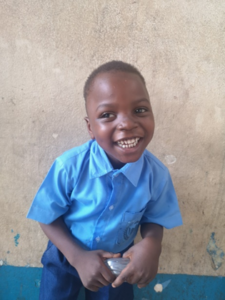Good quality antenatal and child health services in Sierra Leone, West Africa, are scarce and often unaffordable. As a result, many children are born with or soon acquire mental and/or physical disabilities, such as Cerebral Palsy and neurological abnormalities, at higher-than-average rates. Widespread misunderstanding complicated by a lack of health and other public support services make these children some of the world’s most vulnerable.
False beliefs about the acquisition of disability are all too common across the West African nation, some attributing disability to a punishment from God as retribution for parents’ sinful behavior or an act of the devil, laying blame upon a mother and depreciating her for causing the disability.
Enable the Children (ETC), a World Hope program, utilizes a team of local and expatriate staff who provide physical and occupational therapy, care, and support services to over 1,200 children living with disabilities in Freetown, Sierra Leone.
ETC staff visit patients in their homes and teach families and caregivers how to support children with disabilities using play, developmental positioning, and feeding support. This allows families the opportunity to learn to provide at-home care and treatment to children in a manner that is sustainable in their everyday lives. ETC also provides support for the family unit as they learn to look after the child and provide a loving, nurturing home life.
MEET ALIM

Alim (Photo Provided by World Hope).
The ETC Team have worked with Alim for over three years now. When Alim first presented at an ETC clinic, he was unable to stand independently, pull to stand, or walk due to Diplegic* Cerebral Palsy.
The ETC team visited Alim at home and taught his Mom and Granny exercises to do with Alim that helped him put weight on his lower limbs and strengthen his gluteal muscles. The staff also provided Alim with a wooden walker and a standing frame to help with standing and weight bearing on his lower limbs.
The ETC team also conducted psychosocial counseling with neighbors who were ostracizing Alim’s mom by spreading rumors about Alim throughout the community and refused to go near or touch Alim. The counseling helped the community to accept and care for Alim.
The team also gave Alim’s mom a small amount of financial support, which enabled her to develop her business and provide for the household.
Now with all the equipment, exercises, and encouragement, Alim can walk independently on flat surfaces. Alim still struggles to walk on uneven ground, so the team will continue with therapy to help Alim improve. Through the ETC Program, Alim received a scholarship to attend a Christian school where is warmly accepted and doing well in his learning.
During a recent therapy session, Alim’s mom shared that she appreciates that the ETC team prays with her and Alim, and she has been taking Alim to church for prayers even though she is a Muslim.
Now that the community is more accepting of Alim, his dad has returned home and is taking on his responsibilities.
*Spastic diplegia cerebral palsy occurs when the portion of the brain that controls movement is damaged or develops abnormally. This usually occurs before birth but can happen at any time while the brain is still developing (usually before age two).


 Founded in 2006 by Jan and Trevor Rees-Jones, The Rees-Jones Foundation is a private foundation that works with nonprofit organizations, primarily in North Texas, to serve and improve the quality of life of others in tangible ways.
Founded in 2006 by Jan and Trevor Rees-Jones, The Rees-Jones Foundation is a private foundation that works with nonprofit organizations, primarily in North Texas, to serve and improve the quality of life of others in tangible ways.